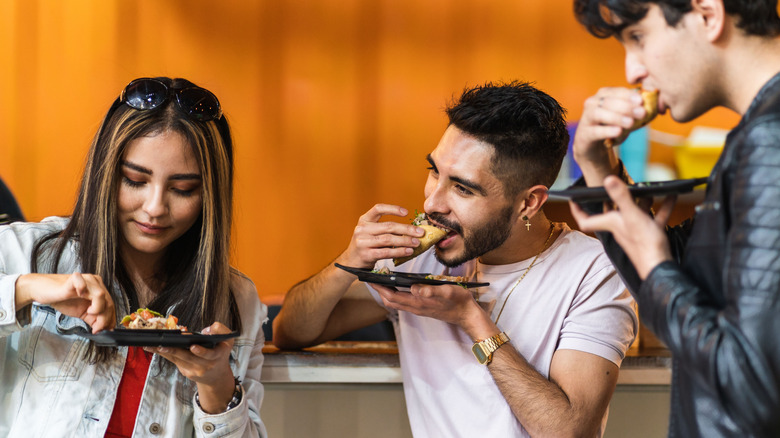How Does Acquired Taste Actually Work?
Any kid that snuck a sip of beer from their parents knows about acquired taste. Back at that age, beer was absolutely revolting and couldn't possibly live up to juice or soda — but as adults, the whole game changes. According to Mental Floss, humans enjoy sweet foods and drinks from birth, but steer clear of spicy, bitter, or other pungent foods until later in life. Avoiding these foods especially makes sense with funky or fermented items like blue cheese because the smell is one that could be associated with harmful bacteria.
According to the Boston Globe, people can be genetically predisposed to dislike certain foods, too. For example, those who think cilantro tastes like soap have variations in their olfactory receptors. People that are considered "super-tasters" also get a really bitter taste from some green vegetables. While it's difficult to defy genetics, if you want to like a food that you never enjoyed previously, don't give up hope — there's a way to train yourself to like it.
The more we are exposed to something, the more we like it
When people mention acquired taste, it sounds like one day you just wake up liking it, but unfortunately that's not the case. Acquiring a taste is a process that requires repeated exposure to the food you want to enjoy. According to Inc., in the late 1960s, psychologist Robert Zanjonc conducted a study where participants were shown a series of images in rapid succession, some of which repeated. After the viewing, participants reported a preference for the images that appeared more frequently — and apparently, the same principle applies to food.
There's rarely spicy or funky foods on a kids menu, so young ones are not familiar with these flavors and believe they don't like them. According to Mental Floss, if humans didn't acquire tastes outside of the sweet flavors we are all born to love, we wouldn't get enough nutrients to survive. Luckily, most acquired tastes happen passively via cultural and social learning. If all the people around us are enjoying a certain food, we want to enjoy it too and are more willing to try it. Mental Floss explains that adolescence is a critical time for taste preferences because we are most susceptible to peer influence. Basically, acquired taste is a mind game. If you think you don't like something and avoid it, nothing will change — but if you try it a bunch of times, you can condition yourself to like it.

